Volkswagen Group Bundle
How did a "people's car" become a global automotive giant?
The Volkswagen Group's story is a compelling saga of ambition and innovation, born from a vision to democratize transportation. From its inception in 1937 as a project to build an affordable car for the masses, the company has evolved into a powerhouse in the automotive industry. This journey, marked by both triumphs and tribulations, offers a fascinating glimpse into the Volkswagen Group SWOT Analysis and the evolution of a German car manufacturer.
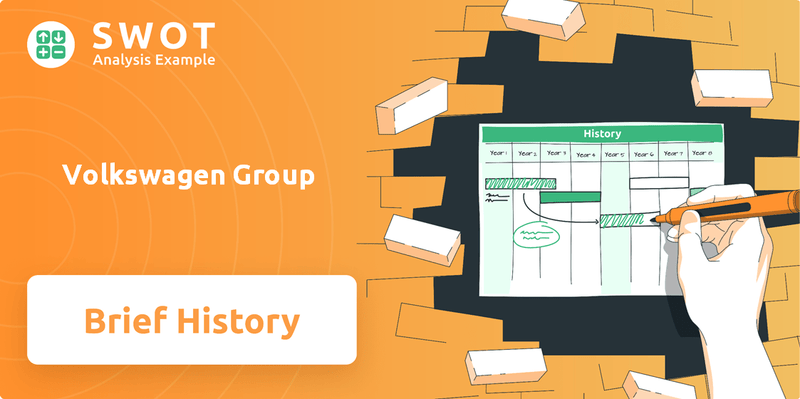
Delving into the VW history, we'll uncover the pivotal moments that shaped the Volkswagen company, from its early years to its current status. Explore the Volkswagen Group origins and evolution, including its expansion across the globe and the strategic acquisitions that fueled its growth. Discover how Volkswagen became successful, overcoming challenges and controversies to become a leading force in the automotive industry.
What is the Volkswagen Group Founding Story?
The Volkswagen Group's story began on May 28, 1937, with the formation of 'Gesellschaft zur Vorbereitung des Deutschen Volkswagens mbH.' This marked the official start of what would become a global automotive powerhouse. The vision was spearheaded by Ferdinand Porsche, a brilliant automotive engineer, who aimed to create an affordable car for the average German citizen.
The initial goal was to address the lack of accessible cars for the general public. This led to the development of the 'KdF-Wagen' (Kraft durch Freude – 'Strength Through Joy' Car), later known as the iconic Volkswagen Beetle. The company's name, 'Volkswagen,' meaning 'people's car,' directly reflected its mission.
The early business model involved a state-sponsored savings scheme, allowing citizens to contribute towards owning a vehicle. Initial funding primarily came from the government, reflecting the nationalistic context of its establishment. The company's creation was significantly influenced by the prevailing political and economic conditions in Germany, with the aim of mobilizing the population and boosting industrial growth. The VW history is a fascinating journey through the automotive industry.
Here are some key facts about the founding of the Volkswagen company:
- Founded on May 28, 1937, as 'Gesellschaft zur Vorbereitung des Deutschen Volkswagens mbH.'
- Initiated by Ferdinand Porsche to create an affordable car for the masses.
- The 'KdF-Wagen' (later the Beetle) was the first major project.
- The name 'Volkswagen' means 'people's car,' reflecting its mission.
Volkswagen Group SWOT Analysis
- Complete SWOT Breakdown
- Fully Customizable
- Editable in Excel & Word
- Professional Formatting
- Investor-Ready Format
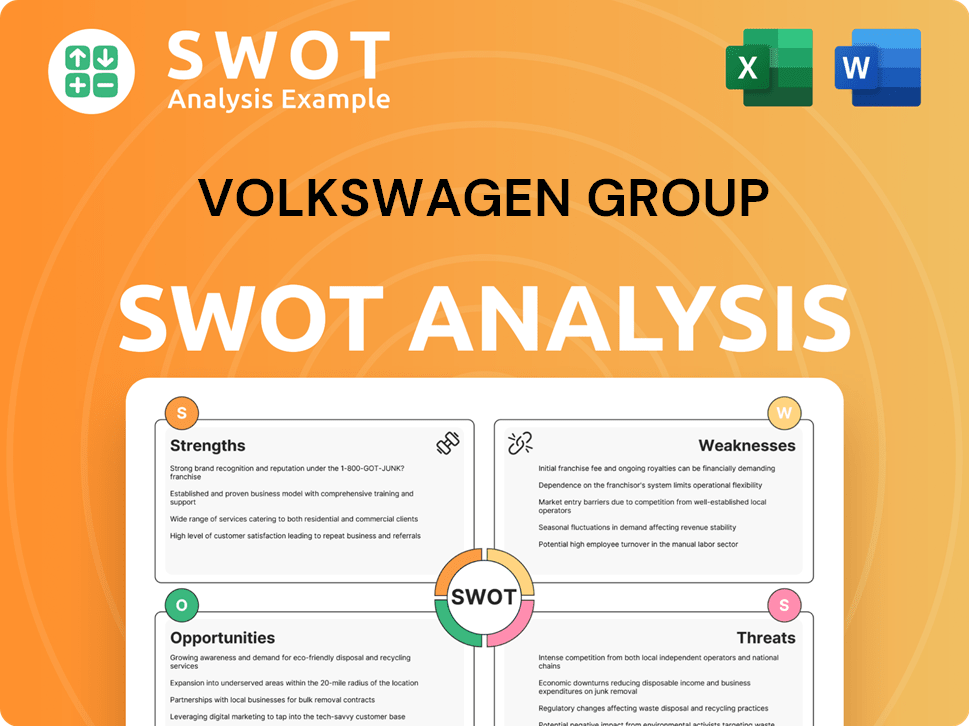
What Drove the Early Growth of Volkswagen Group?
The early growth of the Volkswagen Group was significantly influenced by post-World War II developments. After the war, the factory came under British control, with Major Ivan Hirst playing a key role in restarting production of the Beetle. The resumption of Beetle production in 1945 marked a major milestone, quickly gaining traction due to its robust design and affordability. The company focused on rebuilding and expanding production capacity for the Beetle, which became an iconic global success. This period is crucial for understanding the Mission, Vision & Core Values of Volkswagen Group.
The Beetle's production restarted in 1945, a pivotal moment for the VW history. This marked the beginning of the company's post-war recovery and its rise in the automotive industry. The Beetle's design and affordability resonated with a market eager for reliable and economical transportation.
The initial strategy involved expanding production capacity and establishing a robust dealer network to support the growing demand for the Beetle. Strategic entry into international markets, particularly the United States in the 1950s, was a key factor. This expansion was largely organic, driven by the Beetle's popularity.
Leadership transitions, such as the appointment of Heinrich Nordhoff in 1948, were critical in steering the company toward commercial success and internationalization. The market reception was overwhelmingly positive, especially in the post-war era. The competitive landscape was less saturated, allowing Volkswagen to establish a dominant position.
This early growth period solidified Volkswagen's identity as a producer of reliable, mass-market vehicles. The initial focus on the Beetle laid the foundation for future diversification and expansion. By the late 1950s, the Beetle was a global phenomenon, with production numbers soaring. The success of the Beetle helped establish the German car manufacturer as a major player.
Volkswagen Group PESTLE Analysis
- Covers All 6 PESTLE Categories
- No Research Needed – Save Hours of Work
- Built by Experts, Trusted by Consultants
- Instant Download, Ready to Use
- 100% Editable, Fully Customizable
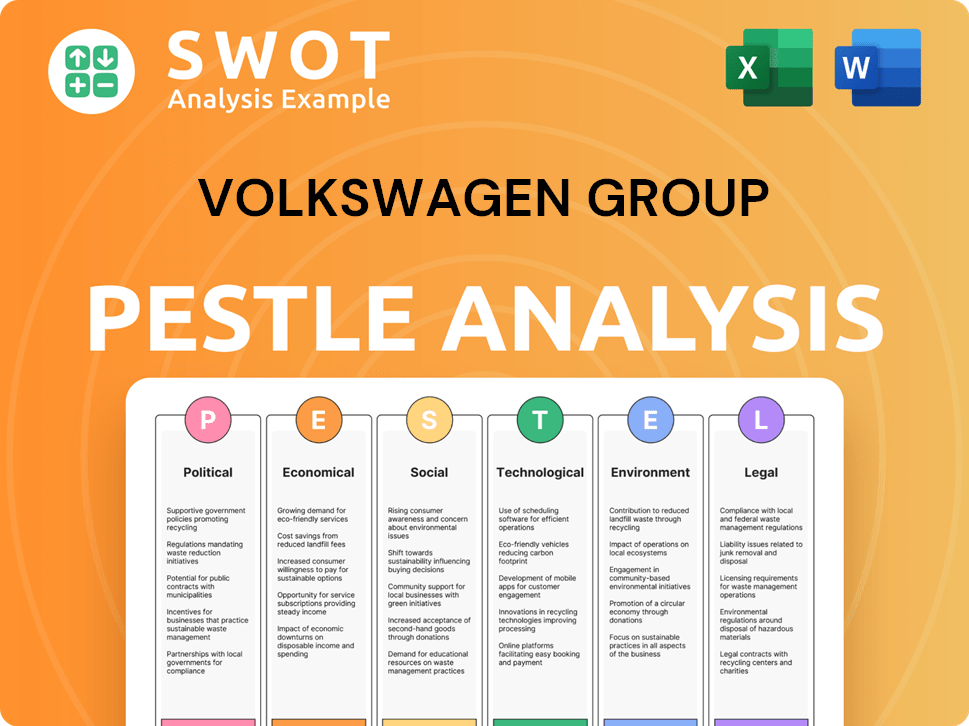
What are the key Milestones in Volkswagen Group history?
The Volkswagen Group, a prominent German car manufacturer, has a rich history marked by significant milestones. From its origins to its current status in the automotive industry, the company has experienced remarkable changes and growth. The VW history reflects its adaptation to market demands and technological advancements.
| Year | Milestone |
|---|---|
| 1937 | Volkswagen is founded, with the goal of producing an affordable car for the masses. |
| 1945 | Post-World War II, the company is revived under British control, focusing on the production of the Beetle. |
| 1972 | The Volkswagen Beetle surpasses the Ford Model T as the world's best-selling car, solidifying its place in automotive history. |
| 1974 | The Golf is introduced, replacing the Beetle as the company's flagship model and marking a shift towards modern front-wheel-drive vehicles. |
| 1986 | Volkswagen acquires the Spanish car manufacturer SEAT, expanding its brand portfolio. |
| 1998 | Volkswagen acquires the luxury car manufacturer Bentley, further diversifying its offerings. |
| 2015 | The 'Dieselgate' emissions scandal emerges, leading to significant financial and reputational damage. |
| 2021 | Volkswagen delivers over 452,900 battery-electric vehicles (BEVs) worldwide, a significant increase. |
| 2023 | Volkswagen Group delivered 9.24 million vehicles to customers worldwide. |
The Volkswagen company has been at the forefront of automotive innovation. These innovations have played a crucial role in shaping the automotive industry.
The Volkswagen Beetle's design and mass appeal made it a global success. Its innovative engineering and iconic status set a new standard in the automotive industry.
The Golf's introduction marked a shift towards modern, front-wheel-drive vehicles. This strategic move helped the company adapt to changing consumer preferences.
The development of the DSG technology improved driving performance and efficiency. This innovation enhanced the driving experience for Volkswagen customers.
Pioneering advancements in diesel engine technology aimed to improve fuel efficiency and reduce emissions. However, this later led to significant challenges.
Volkswagen is investing heavily in EV research and development, with a goal to have over 50% of its sales be fully electric by 2030. The company's strategy includes launching several new EV models.
Focusing on digital transformation to improve connectivity and enhance the overall customer experience. This includes integrating advanced technologies into its vehicles.
The Volkswagen Group has faced several challenges throughout its history. These challenges have tested the company's resilience and adaptability.
The emissions scandal led to significant financial penalties and reputational damage. This crisis forced the company to reassess its strategic direction and practices.
Navigating global economic downturns has impacted sales and profitability. The company has had to adapt its strategies to manage economic uncertainties.
The automotive industry is highly competitive, requiring continuous innovation and efficiency. Volkswagen faces competition from both established and emerging automakers.
Recent supply chain disruptions, including semiconductor shortages, have impacted production. The company is working to diversify its supply chains to mitigate risks.
The transition to electric vehicles requires substantial investment and technological advancements. Volkswagen is focusing on developing new EV platforms and models.
Adapting to changing consumer preferences, including demand for SUVs and electric vehicles, is crucial. Volkswagen is expanding its product range to meet these evolving needs.
Volkswagen Group Business Model Canvas
- Complete 9-Block Business Model Canvas
- Effortlessly Communicate Your Business Strategy
- Investor-Ready BMC Format
- 100% Editable and Customizable
- Clear and Structured Layout
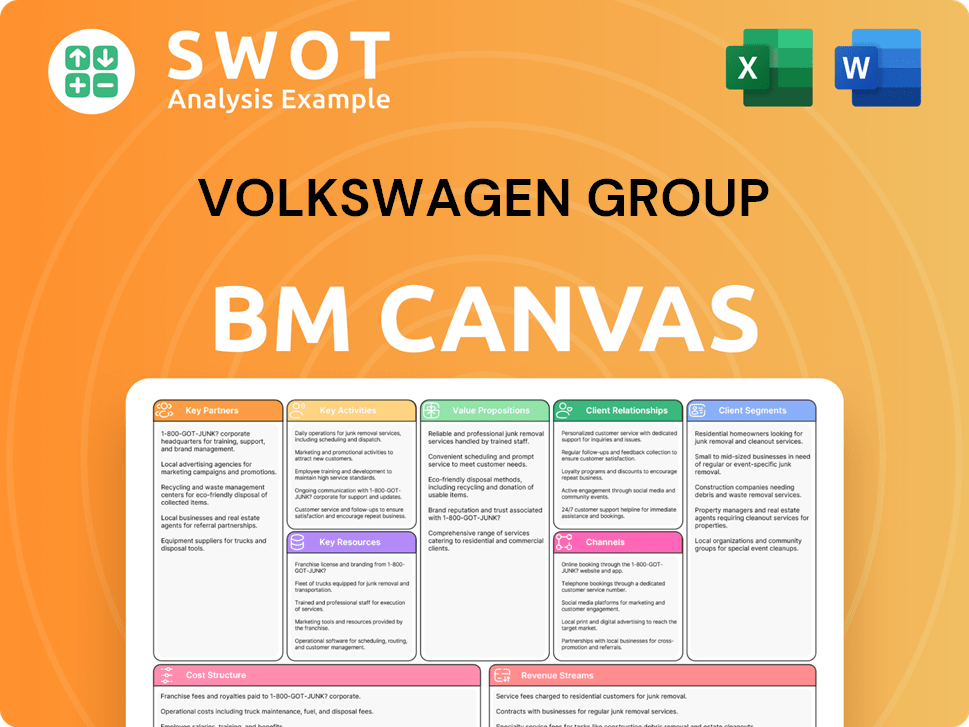
What is the Timeline of Key Events for Volkswagen Group?
The Volkswagen Group, a prominent German car manufacturer, has a rich history marked by significant milestones. From its origins in 1937 to its current position in the automotive industry, the company's journey reflects both innovation and challenges. The VW history includes pivotal moments, such as the post-war Beetle production, strategic acquisitions, and the more recent shift towards electric mobility. This timeline highlights key events in the evolution of the Volkswagen company.
| Year | Key Event |
|---|---|
| May 28, 1937 | 'Gesellschaft zur Vorbereitung des Deutschen Volkswagens mbH' is founded, marking the company's inception. |
| 1945 | Production of the Volkswagen Beetle resumes after World War II, restarting the company's operations. |
| 1948 | Heinrich Nordhoff is appointed General Director, steering the company towards commercial success. |
| 1965 | Acquisition of Auto Union GmbH, which included the Audi brand, significantly expanding the brand portfolio. |
| 1972 | The Volkswagen Beetle surpasses the Ford Model T in production numbers, becoming the world's best-selling car. |
| 1974 | Introduction of the Volkswagen Golf, a successor to the Beetle and a new best-seller. |
| 1986 | Acquisition of SEAT, expanding the Group's reach into the Spanish market. |
| 1991 | Acquisition of Škoda, further diversifying the brand portfolio. |
| 1998 | Acquisition of Bentley, Bugatti, and Lamborghini, entering the luxury and supercar segments. |
| 2015 | The 'Dieselgate' emissions scandal comes to light, leading to a major strategic shift. |
| 2016 | Volkswagen Group announces its 'TOGETHER – Strategy 2025,' emphasizing electric mobility and digitalization. |
| 2020s | Accelerated investment and rollout of electric vehicle platforms and models, such as the ID. series. |
| 2023 | Volkswagen Group delivers approximately 9.24 million vehicles worldwide. |
The future of the Volkswagen Group is heavily centered on electric vehicles (EVs). The company is investing substantially in EV platforms and models, such as the ID. series. The goal is to have over 50% of its sales be fully electric by 2030, reflecting a strong commitment to sustainable transportation.
Volkswagen aims to transform from a traditional automaker into a software-driven mobility provider. This 'NEW AUTO' strategy emphasizes the development of autonomous driving technologies and the expansion of digital services. The company is adapting to meet the changing demands of the automotive industry, incorporating connected and autonomous vehicle technologies.
The automotive industry is influenced by increasing demand for sustainable transportation and stricter emission regulations. The rise of connected and autonomous vehicles also shapes the future. Volkswagen faces strong competition in the EV market, but its investments and brand recognition position it well for success.
Leadership consistently reiterates the commitment to a carbon-neutral future and digital innovation. This focus aligns with the original vision of providing accessible, forward-thinking mobility solutions. With ongoing investments in research and development, Volkswagen is working to maintain its position as a leader in the automotive industry.
Volkswagen Group Porter's Five Forces Analysis
- Covers All 5 Competitive Forces in Detail
- Structured for Consultants, Students, and Founders
- 100% Editable in Microsoft Word & Excel
- Instant Digital Download – Use Immediately
- Compatible with Mac & PC – Fully Unlocked
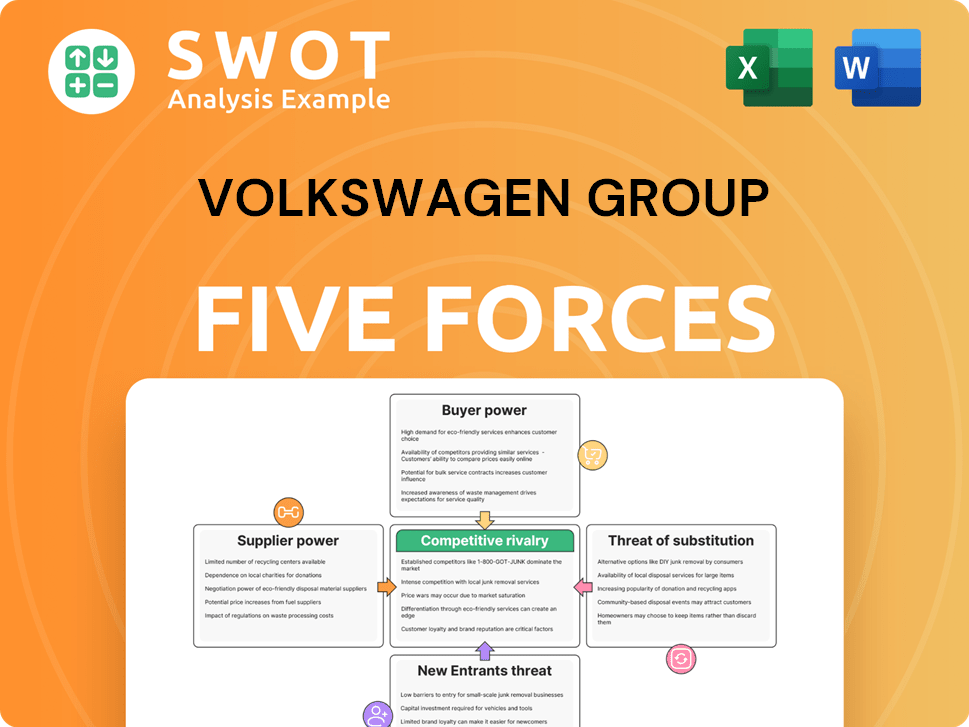
Related Blogs
- What is Competitive Landscape of Volkswagen Group Company?
- What is Growth Strategy and Future Prospects of Volkswagen Group Company?
- How Does Volkswagen Group Company Work?
- What is Sales and Marketing Strategy of Volkswagen Group Company?
- What is Brief History of Volkswagen Group Company?
- Who Owns Volkswagen Group Company?
- What is Customer Demographics and Target Market of Volkswagen Group Company?
Disclaimer
All information, articles, and product details provided on this website are for general informational and educational purposes only. We do not claim any ownership over, nor do we intend to infringe upon, any trademarks, copyrights, logos, brand names, or other intellectual property mentioned or depicted on this site. Such intellectual property remains the property of its respective owners, and any references here are made solely for identification or informational purposes, without implying any affiliation, endorsement, or partnership.
We make no representations or warranties, express or implied, regarding the accuracy, completeness, or suitability of any content or products presented. Nothing on this website should be construed as legal, tax, investment, financial, medical, or other professional advice. In addition, no part of this site—including articles or product references—constitutes a solicitation, recommendation, endorsement, advertisement, or offer to buy or sell any securities, franchises, or other financial instruments, particularly in jurisdictions where such activity would be unlawful.
All content is of a general nature and may not address the specific circumstances of any individual or entity. It is not a substitute for professional advice or services. Any actions you take based on the information provided here are strictly at your own risk. You accept full responsibility for any decisions or outcomes arising from your use of this website and agree to release us from any liability in connection with your use of, or reliance upon, the content or products found herein.